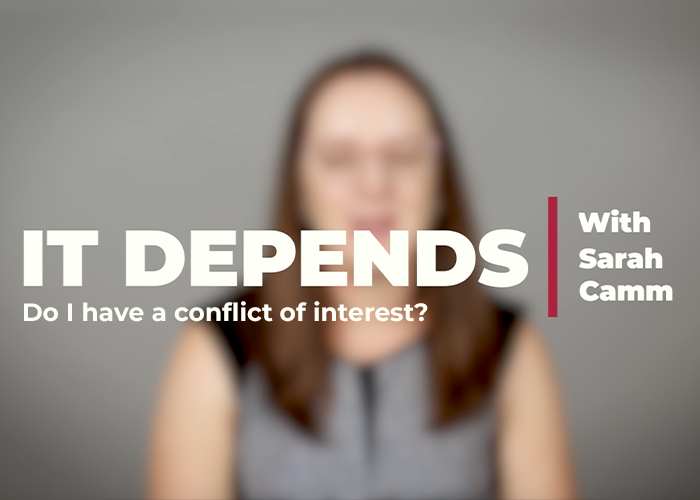Authored by: David Grace and Stephanie Gibbons
In a recent decision, the High Court of Australia considered the nature of an ‘understanding’ for the purposes of the restrictive trade practices provisions within Part IV of the Competition ...

In this edition of ‘It depends’, associate Sarah Camm talks about conflicts of interest. As a part of their Estate Planning Masterclass series, Hayley Mitchell and Sarah Camm will be hosting a webinar on this topic on Thursday 7 December. Register now.
Hi, and welcome to another episode of It Depends. This week we’re talking about conflicts of interest. Hayley Mitchell and I are currently holding a series of estate planning webinars. We’ll be talking about conflicts of interest in our webinar on Thursday the 7th of December 2023. So, come along if you’d like to hear more.
A conflict of interest occurs where a person is responsible for making a decision, but they also have a vested interest in the outcome. Or they might have the opportunity to benefit personally from the decision that they are making. In our succession law world, we see conflicts of interest arise where an attorney is making a decision on behalf of the principal and they might be able to benefit themselves out of that decision, or where a trustee of a discretionary trust is making decisions and they’re also a beneficiary or in self-managed superannuation funds where the trustee of a deceased member’s fund is making decisions about how to pay the death benefits.
An attorney is required to act in the interests of the principal, and as part of this, they must avoid entering into transactions that involve a conflict of interest. So, for example, if they transfer property to themselves, this is pretty clearly a breach of their obligation to avoid a conflict. But importantly, that applies whether they pay market value for that asset or not. Sometimes an attorney lives in a property that’s owned by the principal, which can also involve a conflict of interest, if this hasn’t been authorised by the principal in the enduring power of attorney document. Again, this can still be a conflict, even if the attorney is paying rent.
It depends on the type of decision that you’ve made and the role that you had when you were making that decision. For example, if you’re an attorney and the principal is still alive and has capacity, then they can authorise that decision. Otherwise, the court can authorise that decision if the principal lacks capacity. Ideally, that approval will be sought before you make the decision, but it can be retrospective. Where a trustee is making a decision that involves a conflict of interest, the beneficiaries who are affected by that decision could consent to the decision, or a court application could be made so that the court can sanction the conflict of interest.
It depends. Broad authorisations of conflicts of interest can be really risky because the person that you’re authorising to act in a way that benefits themselves could take that further than you’re actually expecting them to. They might make decisions that are to your detriment or to the detriment of the beneficiaries of your estate. For this reason, clauses permitting conflicts of interest should be drafted carefully and having regard to your specific circumstances. For more information on conflicts of interest when they arise, how to identify them and when court intervention might be required, come along to our webinar on Thursday or contact a member of our private clients team today.
This publication is for information only and is not legal advice. You should obtain advice that is specific to your circumstances and not rely on this publication as legal advice. If there are any issues you would like us to advise you on arising from this publication, please let us know.
Subscribe to our interest lists to receive legal alerts, articles, event invitations and offers.

Cooper Grace Ward acknowledges and pays respect to the past, present and future Traditional Custodians and Elders of this nation and the continuation of cultural, spiritual and educational practices of Aboriginal and Torres Strait Islander peoples.
Fast, accurate and flexible entities including companies, self-managed superannuation funds and trusts.